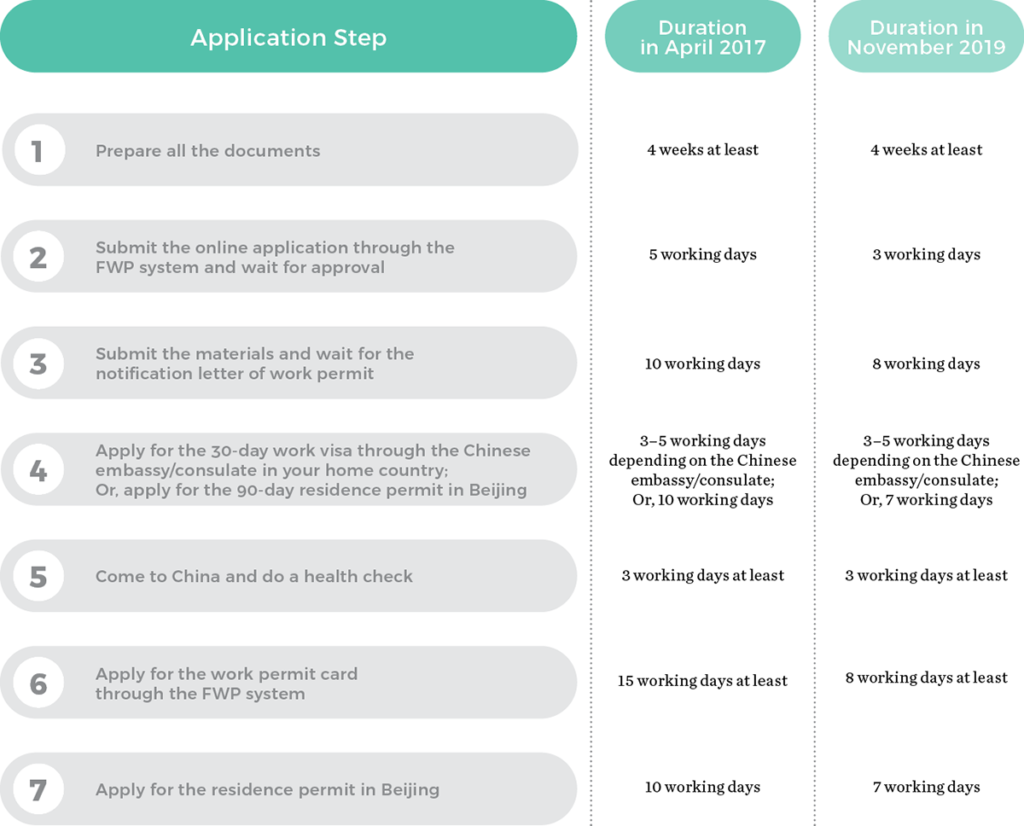
Updates on foreigners’ work permit, visa and residence permit policies
The Work Permit issued by the Foreign Expert Bureau and the Residence Permit for work issued by the Exit and Entry Administration of the Public Security Bureau (PSB Visa Office) are required for foreigners to work legally under a labour contract in China. Nina Jiang, Senior Human Resources Manager with the European Chamber, fills us in on the recent reforms in the visa and work permit system, and how they affect foreign employees.
The amended foreigners’ work permit (FWP) system was implemented nationwide on 1st April 2017. From then on, the Foreign Expert Permit and the Alien Employment Permit were combined into one Work Permit. This permit involves a points system that classifies foreigners into A, B and C categories, illustrating the talent attraction strategy in China. However, from our observations, the advantages between the A and B/C categories for talent who have been working in China is not immediately obvious.
Meanwhile, in the European Chamber’s Business Confidence Survey 2019, the feedback on “what are the challenges faced by your company when applying for work permits for foreigners?” reflects the concerns among member companies.
How complicated is the certification procedure?
The process is simplified for Category A talent, with paperless verification available when applying for the FWP notification letter. However, the majority of applicants fall under Category B or C, which means the two main documents—education degree verification and non-criminal record—must be notarised.
- Education degree: If the education degree is obtained in China, it can be used directly; however, if obtained overseas, it needs to be notarised by an authority, which can often take up to one month to process. In a recent case involving a Spanish citizen that obtained their Master’s in the UK, there were three channels available:
- notarised by a Notary Office and the Foreign and Commonwealth Affairs Office in the UK then legalised by the Chinese embassy/consulate in the UK;
- notarised by the Spanish Ministry of Education then legalised by the Chinese embassy/consulate in Spain;
- notarised by the Ministry of Education in China.
- Non-criminal record: It’s convenient if an embassy/consulate in China can issue the non-criminal record directly, but if the foreigner has to obtain the report from their home country, it needs to be issued either by the public security authority or the justice department, then notarised by the Chinese embassy/consulate. In some countries, the report needs to go through the authorities at the municipal, provincial and then national level to the Ministry of Foreign Affairs.
How long is the application period?
To demonstrate the whole procedure and timeline to apply for the work permit (over 90 days) and residence permit, we will take as example a Category B foreigner taking up a job in Beijing. Even though the current process duration has been shortened by 17 working days compared with the April 2017 process, it still takes at least two and a half months to complete the whole procedure, assuming that every step goes smoothly.

What changes have been made in practice?
With the Chinese Government reorganisation and the new approach to optimising the business environment at both the national and local levels, we have observed the following gradual improvements:
1.The length of work permit and residence permit can be two–five years
Under the new system, the length of a work permit and residence permit can be two to five years, depending on the company contract and government approval, instead of having to be renewed annually as previously.
2.Two-year work experience requirement is waived for Master’s degree holder
If the foreigner is an “excellent foreign graduate” from a Chinese university or a world-renowned university with a Master’s degree or higher, the employer can help him/her to apply for a work permit within a year of their graduation and the two-year work experience requirement can be waived. In some regions, only a Bachelor degree is required for high-tech companies.
3.Renewal of work permit for those over 60 years old under Category B
In Beijing, the work permit renewal application has been simplified for foreigners aged over 60. Preliminary approval from the Foreign Expert Bureau is necessary. If the foreigner can provide consecutive residence permits in Beijing for five years or more, only an application letter and health commitment are required along with the normal application documents to proceed with the renewal.
4. 12 measures of immigration and exit-entry service administration policies
On 1st August 2019, the National Immigration Administration of the Ministry of Public Security issued 12 measures on immigration policies. One highlight is that foreign students of overseas universities can apply through Chinese embassies/consulates for the year-long S2 visa to take up an internship if they have a confirmation letter from their university and an invitation letter issued by a well-known company or public institution in China. On arrival, the foreign student can then apply for an ‘internship’ note at the PSB Visa Office.
What can we expect in the near future?
Article 3 of the Opinions of the State Council on Further Capitalising on Foreign Investment (Guofa No. 23 [2019]) released on 30th October, states that:
“Increasing the ease for foreigners to work in China. Based on the needs of local economic development, limitations such as age, academic qualifications and work experience may be suitably relaxed for regions urgently needing innovative and entrepreneurial talents and skilled professionals. Foreign exchange students with innovative and entrepreneurial plans may apply for a two-year residence permit in the private-business category with their graduation certificates from Chinese tertiary institutes. Foreigners who have applied for the residence permit for work for two consecutive times may be granted a residence permit for work that is valid for five years when applying for the third time. The application process for a Chinese work permit for foreigners shall be optimised and the interdepartmental information-sharing mechanisms perfected. The possibility of combining work permits and residence permits for work for foreigners shall also be explored. (The Ministry of Foreign Affairs, Ministry of Science and Technology, Ministry of Human Resources and Social Security, National Immigration Administration and provincial people’s governments shall perform their respective duties).”
The European Chamber will keep on delivering feedback from our member companies to the Chinese authorities; meanwhile, we will also continue to monitor the government’s policies and update members on any developments.


Recent Comments